- Home
- Andrea Penrose
Murder on Black Swan Lane Page 9
Murder on Black Swan Lane Read online
Page 9
“Did you keep it locked?” demanded Wrexford.
“Yes, of course I did. I simply figured I had been careless and not turned the key properly. You can be sure I was far more careful after that.” The baron scowled at the memory. “I rang a peal over his head that is likely still ringing in his ears.”
Wrexford felt the interrogation slipping away from him. “According to Drummond—”
“You’re more of a fool than I thought if you believe a word he says,” cut in Canaday. “Ask anyone who works in that section of the building. Drummond is considered an odious piece of shite. The only reason he has a position at the Institution is because he’s some sort of distant cousin of Davy’s wife. Otherwise he wouldn’t be tolerated.” A snort punctuated the assertion. “He has naught but an inferior intellect—and certainly no discernable skills in chemistry.”
Making one last effort to put the baron on the defensive, Wrexford countered, “Drummond was quite specific about his claim to have seen you and Holworthy. He claims he saw you there last Thursday evening, somewhere around nine o’clock.”
Canaday let out a rude sound. “That’s impossible. Last Thursday evening I was at a meeting of the Royal Geological Society.”
“I assume the Society will confirm that,” said Wrexford. He was beginning to have more sympathy for a Bow Street Runner. It wasn’t very edifying to be made to look like a donkey’s arse.
“By Jove, of course they will,” retorted Canaday. “I was one of the featured speakers of the evening, and my lecture on the history of tin mines in Cornwall began at exactly the hour you just mentioned.”
Wrexford thought hard but couldn’t come up with any other questions to ask.
“Now, unless you have any other absurd accusations to make, my friends are waiting.”
Maintaining a grim silence, the earl stepped aside, allowing Canaday to brush by.
Sheffield made a wry face as the door slammed shut. “Well, that did not go according to the script.”
Wrexford shot him a daggered look.
“Er, quite right—it may not be the right moment for frivolous humor,” murmured his friend, assuming an air of contrition. “All jesting aside, it strikes me that he is telling the truth.”
“The lecture is certainly easy enough check, and I will do so. But yes, my sense is it’s not Canaday who is telling the lies,” he replied grimly. “Which means I will be paying another visit to Mr. Drummond in the morning. He has a great deal of explaining to do.”
* * *
Charlotte set down her packages on the table and hung her cloak on the wall peg. The rain was growing heavier, the chill drops taking on an extra sting in the gusting wind. A gunpowder greyness shrouded the streets, muddling with the mists blowing in from the river.
The boys had not returned to the house the previous evening after taking her finished drawing to the print shop. That wasn’t unusual, but she found herself feeling more and more unsettled at the idea of them roaming the stews on their own. Were they dry? . . . Were they hungry? . . . Were they safe? . . .
She forced herself to stop fretting. Worry would only beget worry, and she wasn’t yet sure what she wanted.
Love was a two-edged sword. A force of light and dark. Of joy and pain. For now, she was taking care to stay just beyond reach of its flashing blade.
Turning to her work desk, Charlotte began to straighten up the jars of powdered pigments and check that her brushes were properly cleaned and pointed. No new gossip on Holworthy’s murder had come in from her regular sources. She would need to come up with yet another jab at the king’s profligate sons. The public never tired of seeing the Royals skewered by her pen.
The Duke of Cumberland would make an easy target. He was said to have—
“Oiy! M’lady!” Raven’s shout rose above the patter of running steps.
“Slow down,” she chided, as the boys skidded through the doorway. “Wipe your feet and make a proper greeting.”
Raven chuffed in frustration but knew arguing was a waste of breath. House rules were one of the few things Charlotte could control in her world. Short of Gideon’s trumpet sounding the call to Judgment, they were inviolate.
“Good day, m’lady,” went on Raven in a rush as he bobbed a quick bow. Hawk nearly tripped over his own feet imitating his brother.
“Now can I spill the beans,” he demanded.
“Now you may,” she answered.
“George—y’know George, the ostler at the King’s Crown?”
Charlotte nodded. With all its comings and goings, the coaching inn and its taproom were an excellent font of information.
“Well, last night he was guzzling a tankard of ale with his brother, the one what works at that fancy gentleman’s club on St. James’s Street.” Raven hitched in a breath. “White’s—that was the name.”
The most exclusive establishment in Mayfair. Raven now had her full attention.
“And the brother said one of the porters caught wind of an argument in one of the private rooms.” The boy’s voice rose in excitement. “Between Lord Wrexford and some other toff—”
“Did he perchance know this other toff’s name?” asked Charlotte quickly.
“Aye, it was Canaday,” replied Raven.
The name provoked a sudden tingling sensation at the back of her neck.
“And His Lordship was badgering him wiv questions about the dead reverend, which made Canaday cross as crabs.”
“Said he didn’t know nuffink,” piped up Hawk.
“Nothing, not nuffink,” corrected Charlotte without thinking. Her mind was still tangling with the name of Canaday.
Why is it striking a chord? Some memory from the past seemed to stir, but as yet it was too deep in shadow to discern.
“George’s brother said the porter didn’t hear the rest of the quarrel,” continued Raven, drawing her attention back to his story. “Other than that His Nibs said a man named Drummond had fingered Canaday fer bringing the reverend to the . . .”
“The Royal Institution,” piped up Hawk.
“Right—and that Canaday said it was a bald-faced lie.”
Charlotte frowned in thought.
“It sounded important, so Hawk and me—that is, I—rushed back here te tell you,” added Raven.
“Thank you, I am very glad to know all this,” she assured the two boys.
“Are ye gonna do a drawing of Lord Wrexford breathing fire and smoke?” asked Hawk.
A good question. Charlotte realized that she and the earl had not discussed the subject of her future drawings. Perhaps he had simply made the lordly assumption that he was no longer fair game for her pen.
Droit de seigneur. For men like Wrexford, a sense of entitlement was woven into the very fabric of their being.
She thought about the purse, and whether or not she had sold her soul.
“Did George mention any other details?” asked Charlotte. “Was anyone else present in the room?
Raven looked uncertain. It was Hawk who spoke up. “Didn’t he say Lord Wrexford’s friend Sheff . . . Sheffield was there?”
“Yeah, he did,” agreed his brother with a rueful grimace. “There are times when having you glued te my bum is useful.”
Hawk sniggered. “Don’t say ‘bum.’ It ain’t gentlemanly.”
“You both did very well,” interjected Charlotte. She dug a coin out of her pocket. “Why don’t we celebrate with meat pasties and an apple tart for our supper. That is, if you don’t mind braving the rain again.”
Raven crowed in delight. “No matter—we’re already wet as eels.”
She was hoping they would say as much. Her call of “Take a piece of oilcloth to cover the food!” was lost in the noisy clatter of footsteps and slamming doors.
As soon as they were gone, Charlotte quickly moved to her desk and drew out a slim leather-bound volume from the row of books lined up against the back wall. Opening the back cover, she slid a fingernail under the loosened endpaper and jiggled. A small brass key fell t
o the blotter.
Drawing in a ragged breath, she opened the lower desk drawer. Beneath the sheaf of cheap writing paper was a secure compartment disguised as a false bottom. The key released the lock with a soft snick. She removed a packet of letters tied in brown twine, along with a scrap of paper bearing a few markings in black and red ink, and, repressing a twinge of trepidation, turned up the wick of her lamp.
The niggling feeling about the name Canaday had been growing stronger with each passing moment. The answer, she thought, lay in these old letters. So, too, did sleeping demons.
For an instant she was tempted not to wake them.
But if she was right, the truth could not be ignored.
Another deep breath. Paper crackled. Her fingers, she noted, were trembling. Odd—she prided herself on her steady nerves. Knowing the boys would soon return, Charlotte forced herself to hurry. One by one, she opened the travel-stained letters and skimmed over the neat copperplate script. In places, the ink was blurred.
By rain or by tears? At this point it didn’t really matter. As she read, she summoned a sense of detachment. The words became just words. They couldn’t hurt her.
It was there, in one of the long letters she had received in Rome. Her mind had not been playing tricks on her. Smoothing out the sheet, Charlotte stared at the sketch of a symbol and the accompanying text.
The house is quite grand, and Edward’s friend Canaday is a gracious host. There is riding and shooting each day for the gentlemen, but I occasionally demur and choose to spend the day in the baron’s magnificent library. His grandfather was a noted collector, and there are all sorts of arcane treasures tucked away in the endless nooks and crannies of the cavernous space. You would be delighted by the clever design of the bookmark—an ornate “T” flanked by two tiny wolfhounds.
Here her correspondent had penned a detailed sketch.
The design is printed on a small strip of paper, which is placed inside the front cover of every book. Numerals and letters are handwritten below it, indicating its exact place on the shelves. It’s an ingenious system....
Dear God in Heaven. Charlotte looked up and pinched at the bridge of her nose, suddenly seeing the connection. Drawing a shaky breath, she carefully unfolded the scrap of paper she had plucked from the murdered reverend’s shirt cuff.
There could be no doubt. Jeremy was an excellent artist. The two drawings matched.
“Damnation,” whispered Charlotte, wishing it were not so. She stared a moment longer before returning all the papers to their hiding place and relocking the compartment.
Cry “Havoc” and let slip the dogs of war? She was now caught in the jaws of a moral dilemma. Should she keep a leash on her tongue and guard her own peace? Telling Wrexford about what she knew could put her own secrets in jeopardy. The earl, for all his faults, struck her as a man who could fight his own battles.
“Damn, damn, damn.” Closing her eyes, Charlotte pressed her palms to her brow. Perhaps come morning, the answer would be clearer.
* * *
Tyler followed Wrexford up the steps to the Royal Institution. “Remind me again of why it was necessary to roust me from my bed at the crack of dawn.”
“Stubble the whining,” retorted the earl. He wasn’t any happier than his valet at the ungodly hour. His mood was never at its best before a pot of coffee. “You pick a lock faster than I do. I want to have a look around Drummond’s laboratory while he is not there.”
“I’m expected to break the law? How jolly.”
Wrexford didn’t answer. Quickening his steps, he marched past the watchman, who didn’t dare issue a challenge, and headed up to the top floor of the building. Rank had its privilege. Even if Drummond walked in on them, he didn’t think the chemist would dare to accuse him of foul play.
The corridor was quiet as a crypt. The tattoo of their boot heels as they started down its shadowed length echoed loud as gunfire off the dark wood wainscoting.
“It seems the Institution’s acolytes of science keep gentlemen’s hours,” quipped Tyler. The aristocracy rarely rose until after noon.
“Unfortunately not all. Mr. Drummond appears hard at work, despite the early hour.” Wrexford spotted a pool of oily light up ahead. It was leaking out from beneath the door of the chemist’s laboratory.
So, too, was a tendril of smoke.
At the sound of glass exploding he broke into a run.
The door was ajar. The flames licking up from a large crucible had set the wall shelf on fire, and the burning wood ignited another loud bang as several more jars of chemicals exploded.
Hunching down, Wrexford covered his nose with the tails of his cravat and darted toward the long workbench, looking for something with which to smother the flames. There looked to be a second blaze rising at the far end of the room. Heat swirled through the air, punctuated by an ominous hissing and crackling. He could just make out books and papers were piled in a pyramid....
What the devil is going on?
A cloud of smoke, dark and gritty, was fouling the room, making it hard to see. Tyler, he noted, had found an overcoat, and had set to work extinguishing the crucible. Choking back a cough, he spun around and started for the other fire, only to trip over a fallen chair.
Cursing, Wrexford put out a hand to break his fall . . . only to hit hard up against an outstretched boot.
Drummond was lying faceup, a peaceful expression on his face, as if he were sleeping. When a hard shake didn’t rouse him, Wrexford abandoned the effort and hurried to deal with the bonfire erupting out of the books.
“Here, take this!” Having put out the fire at his end of the laboratory, Tyler tossed Wrexford the singed coat. “I’ll go warn the watchman and have him fetch help.”
“Tell him to send for a doctor as well!” shouted the earl. Whether Drummond had been overcome by fumes from an experiment or had come to the laboratory befuddled with narcotics, he was going to need medical attention.
Opium seemed the only logical explanation, thought Wrexford grimly, as he fought to bat down the fire and keep it from spreading to the cabinet of chemicals. Why else would Drummond have wreaked such havoc on his own work if not in the grip of drug-induced delusions. A glance around showed several drawers had been upended and the contents doused with what looked to be lamp oil.
The sparks finally sputtered out, and after gingerly rubbing the soot from his raw palms, Wrexford was about to turn his attention to the unconscious chemist when a fluttering of fire-curled paper atop the smoldering books caught his eye. There looked to be several pages of notes, though much of the contents had been reduced to ashes. He recognized Drummond’s handwriting from having thumbed through the man’s ledger of chemicals on his previous visit.
Observations from his experiments? Perhaps another failure had pushed the chemist over the brink.
Curious, he leaned closer. The paper had toasted to a nut brown color, and the letters had a nervous squiggle to their slant, making the words difficult to decipher.
Hearing footsteps in the corridor, Wrexford looked up. Tyler must be returning, though by the sound of it he was alone. Seeing a magnifying glass by the cabinet, he grasped the still-hot handle and focused the lens on the writing, sure that he must be mistaken.
But no, winking larger than life in the polished glass was the same strange phrase—The Golden One is the Devil and must be stopped from destroying . . . A charred patch, and then, Dangerous! The Philo. Stne.
The rest of the message was burned to a crisp.
“The watchman is organizing the porters to bring up buckets of sand,” called a breathless Tyler as he hurried back into the laboratory. Water was known to be dangerous around chemicals.
Wrexford turned, and set down the glass. “The fire is out here, so I think things are safe enough for the moment. It’s only by the grace of God that no sparks fell into the spilled oil. The place would have turned into a raging inferno.”
The acrid smell of smoke and singed sulfur hung heavy in th
e air.
“Let us see if we can revive Drummond,” he went on, “and learn what happened here.”
His valet was already kneeling down by the chemist. “He doesn’t look to be injured, and yet I can’t detect any sign of breathing.”
“Perhaps if we shift him . . .” Wrexford dropped to a crouch and slid a hand under the chemist’s shoulders. Feeling something sticky, he pulled back, and found his fingers were covered with blood.
Tyler exhaled sharply.
“Help me lift him,” commanded the earl.
There was a tiny rent in Drummond’s coat, just below the left shoulder blade.
“Some sort of blade, I would guess,” he muttered. “Shoved in with enough force to penetrate straight to the heart.”
“From what we’ve heard, the man had his fair share of enemies,” said Tyler.
“Yes,” mused Wrexford. “We know he was an odious little sneak. But for someone to murder him and seek to destroy his books and papers seems to indicate a far more serious transgression than simply annoying his fellow members.” He rose and looked around at the disarray for a long moment. “The murder weapon . . . the murder weapon . . .”
Tyler shook his head. “There won’t be a trace of it—”
“Aye, I’m sure there won’t be,” interrupted a loud and unpleasantly familiar voice from just outside the doorway.
The pot of strong coffee and a leisurely breakfast was now looking even more appealing, thought Wrexford with an inward oath.
The Runner appeared, a dark-on-dark shape framed by the fluted white molding. “Your lackey may have disposed of the evidence, but no matter.” Eyes narrowing to the sharpness of a razor’s edge, Griffin allowed a ghost of a smile to flit over his lips. “It seems this time you’ve been caught red-handed, Lord Wrexford.”
CHAPTER 8
“Don’t be daft, Griffin,” snapped Wrexford. “Your cockloft can’t be that empty. If I had murdered the man, I would hardly be so stupid as to send for help and then linger to fight the fire.”
“So it would seem at first blush,” replied the Runner. “And yet, it might also be interpreted as the diabolically clever actions of a cunning killer.” A pause. “Especially when a suspect just happens to be looming over the corpse with the victim’s blood dripping from his hands.”

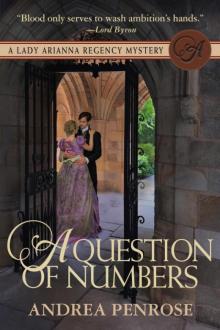 A Question of Numbers
A Question of Numbers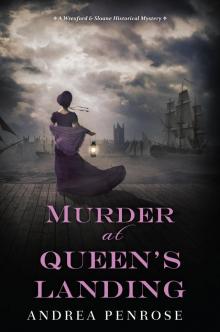 Murder at Queen's Landing
Murder at Queen's Landing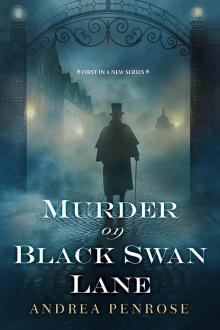 Murder on Black Swan Lane
Murder on Black Swan Lane Sweet Revenge
Sweet Revenge The Cocoa Conspiracy
The Cocoa Conspiracy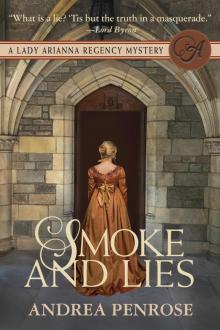 Smoke & Lies
Smoke & Lies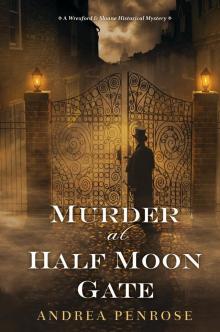 Murder at Half Moon Gate
Murder at Half Moon Gate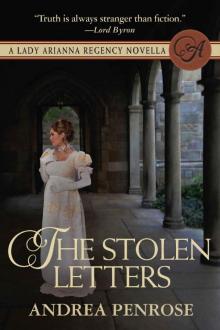 The Stolen Letters
The Stolen Letters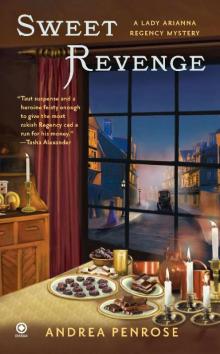 Sweet Revenge lahm-1
Sweet Revenge lahm-1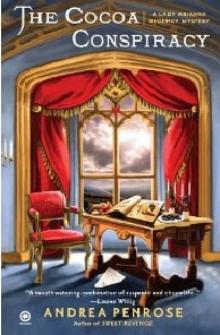 The Cocoa Conspiracy lahm-2
The Cocoa Conspiracy lahm-2